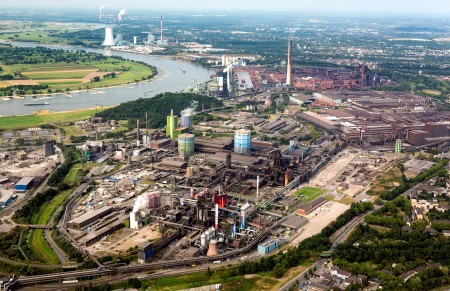Daily press, 2025-07-12, 09:06 am
Consensus reached on collective restructuring agreement ‘Steel Realignment’: thyssenkrupp Steel and IG Metall lay foundation for sustainable future
- Industrial concept and agreement in principle form the basis of the new collective restructuring agreement
- Key points of the operational agreements required for the restructuring have been defined
- Finalization of agreements with target date at the end of September
- Term of the new collective-bargaining agreement September 30, 2030
- Signature of the accord pending agreement on financing
Duisburg, July 12 – thyssenkrupp Steel and the IG Metall union have laid the foundation for the long-term competitiveness and successful positioning of Germany’s largest steel producer. Following intensive negotiations, a joint agreement on a restructuring collective agreement entitled ‘Steel Realignment’ was reached in the night from Friday to Saturday. The basis for this is the industrial concept presented by thyssenkrupp Steel’s Executive Board in November last year and the agreement in principle concluded between IG Metall and the company in May.
At the same time, both parties reached an understanding on the key elements of the operational agreements required for the restructuring, such as a reconciliation of interests and a social compensation plan. These are to be worked out in detail and finalized by the end of September. Both parties remain firmly committed to avoiding compulsory redundancies. The implementation of the agreement is subject to approval by IG Metall members at thyssenkrupp Steel and a pending agreement on the company’s future financing.
The ‘Steel Realignment’ collective agreement essentially regulates three areas, which together are intended to ensure an independent and economically competitive position for thyssenkrupp Steel in the medium term.
1. Adaptations to the production network and investments
A reduction in production capacities to a future target shipping level of 8.7 to 9 million metric tons has been agreed through collective bargaining. Based on this, it is planned to shut down blast furnace 9 at the beginning of the next financial year. Blast furnace 8 is to be removed from the network when the direct reduction plant currently under construction goes into operation. It was also agreed to further detail the plans for an electrical steel mill.
The closure of hot strip mill 3 at the Bochum location will go ahead at the beginning of 2026. It was also agreed to close the electrical steel production site on Castroper Strasse ahead of schedule by the end of the financial year 27/28. The closure of the plant in Eichen is to be avoided. To this end, optimization concepts for the Siegerland site are under review.
On the investment side, in addition to the funds required for maintaining the plants and equipment and for building the direct reduction plant, investments are being made in upgrading a continuous casting line [divider] so as to ensure the supply of narrow slabs required at the Hohenlimburg location. In addition, investments in modernizing Electrical Steel's locations have been agreed.
These adaptations to the production network will be accompanied by a workforce reduction by about 1,600 employees, which is to be implemented by the end of the 2028/29 financial year.
2. Staff reductions through efficiency measures.
In addition to the adaptations to the production network, further personnel efficiency measures have been agreed with the goal of achieving a leaner and more efficient thyssenkrupp Steel in the future. These measures should be implemented by the end of the 2027/28 financial year, and will affect around 3,700 employees.
3. Workforce adjustments through spin-offs (make-or-buy) or sale of business activities
In parallel with the adjustments to the production network and the additional job cuts as part of efficiency measures, a process has been agreed to review and implement ‘make-or-buy’ measures. Up to 4,000 employees are to be outsourced by the end of the 2029/30 financial year.
Not part of the negotiations were the already completed sales of the Spanish company thyssenkrupp Galmed and the Indian subsidiary of thyssenkrupp Electrical Steel, with a total of around 500 employees. In addition, there is the personnel share of around 1,500 employees attributable to thyssenkrupp Steel from the exit from HKM.
Moreover, substantial personnel cost savings have been defined in order to reduce thyssenkrupp Steel's cost position to a competitive level. The measures essentially comprise:
- Cancellation of collectively agreed special payments to safeguard employment and holiday pay, reduction of the so-called ‘Christmas bonus’;
- Reduction in weekly working hours from 34 to 32.5 hours in the unionized sector, with simultaneous temporary suspension of optional working hours;
- Reduction in working hours for non-managerial, non-pay scale employees from 41 to 39 hours;
- Cancellation of the granting of 6 free days for non-pay scale employees, with a buy-back option
- Workforce adjustment instruments;
- Reduction in anniversary bonuses;
- Halving of on-call allowances.
Marie Jaroni, Head of Sales and Transformation at thyssenkrupp Steel: "Following intensive negotiations, the agreement reached together with employee representatives on a restructuring collective agreement is an important milestone for the future viability of thyssenkrupp Steel. We are scaling back excess capacities, improving efficiency, and thus achieving a competitive cost level. This is another urgently needed step into the future of thyssenkrupp Steel."
Dirk Schulte, Chief Human Resources Officer and Labor Director at thyssenkrupp Steel: "The agreement on a collective bargaining framework provides clarity and transparency for our company and its employees. The negotiations demanded significant concessions from both sides, as compromises typically do. With this foundation, we can now move swiftly to finalize the necessary reconciliation of interests and social plans."





